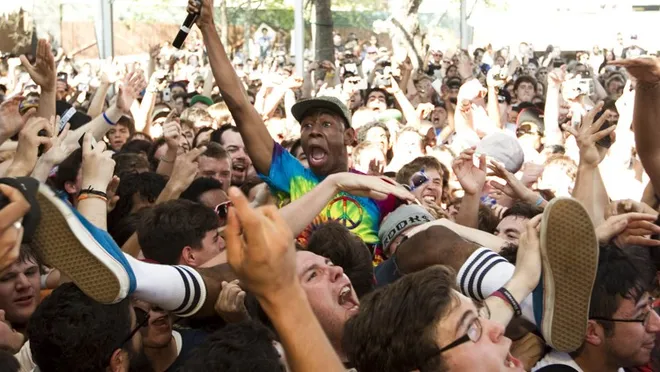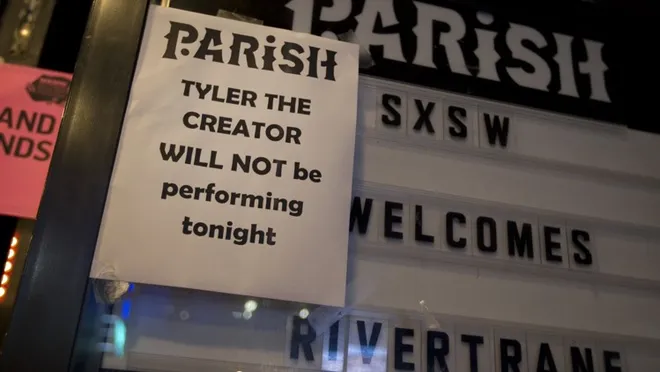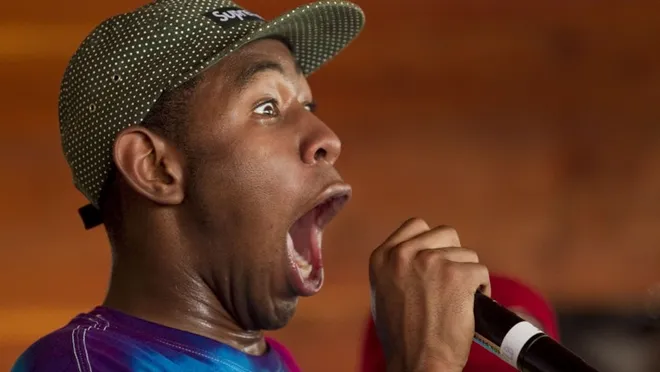
After reaching a plea agreement with prosecutors, Tyler, The Creator, a rapper known for his dark lyrics and rebellious spirit, is no longer facing charges that he incited a riot during the South by Southwest Music Festival in 2014.At an East Austin venue, the 24-year-old had encouraged fans to push through a fence, according to police, and in the flow of people coming into his show, one man punched a bartender.
Authorities have said the case was appropriately handled given the safety concerns caused by the melee and its timing: The incident occurred only hours after a drunken driver plowed into a crowd, killing four festivalgoers. But several lawyers and law professors say the charge against Tyler played into a larger trend of criminalizing young, black rappers and their art.
“The hyperfocus on him as an artist and his lyrics is deeply connected with hyperpolicing of young black men,” Donald Tibbs, a Drexel University law professor. “It is conspicuous. You don’t have to police young black men. You can just police rap music. You still get the exact same thing.”
Tyler has been the first performer in at least a decade to be charged in Travis County with “riot,” a Class A misdemeanor that prosecutors dropped this month. The rapper, born Tyler Gregory Okonma, instead pleaded guilty to a lesser offense of disorderly conduct and paid a $100 fine. The case will be dismissed if he stays out of trouble for three months.
The Scoot Inn frenzy fell in line with the provocateur image that catapulted Tyler to fame in his teenage years, when he was the frontman of now-disbanded Odd Future. But in recent years Tyler has taken steps to clean up his reputation and distanced himself from lyrics in his early recordings that some scholars and feminist groups have criticized as misogynistic, homophobic and hate-filled.
Months before the SXSW incident, he was banned from New Zealand, and since then he has been prohibited from entering Australia and the United Kingdom.
From the beginning, his lawyer, Perry Minton, argued the riot charge was overblown and perpetuated misconceptions of his client, who has no other arrests. “I personally believe there was no riot, and I feel that in the end, the Travis County attorney saw there was never any intent on the part of Tyler to incite anything harmful or dangerous,” Minton said.
Corby Holcomb, assistant director for the trial division at the county attorney’s office, said he didn’t believe police overreacted by arresting the performer, since someone was injured. But Holcomb said prosecutors doubted they could prove the case to a jury.
“The facts of this case are not what one would typically think of, of someone trying to incite a riot,” Holcomb said. “He was telling people to come into his show, not to loot or attack a police officer.”
Police were already at the Scoot Inn that day, after receiving a report of overcrowding, when Tyler began yelling at people outside the venue to push their way past security, an arrest affidavit said.
“All y’all outside the games, y’all push through,” one officer said he heard Tyler shout. As people rushed inside, a bartender trying to protect a woman from being trampled was punched in the face by an unidentified man, the affidavit said.
Immediately after his arrest, some festival bloggers erroneously reported that the deadly SXSW crash had taken place outside the same Tyler concert.
Online that night, Tyler took to Twitter in his all-capital style: “I DONT WANT TO CAUSE ANY TROUBLE, SOME ARE MAKING ME OUT TO BE A BAD GUY, SO IM NOT DOING ANY SHOWS TONIGHT.”

Austin American-Statesman

Austin American-Statesman




